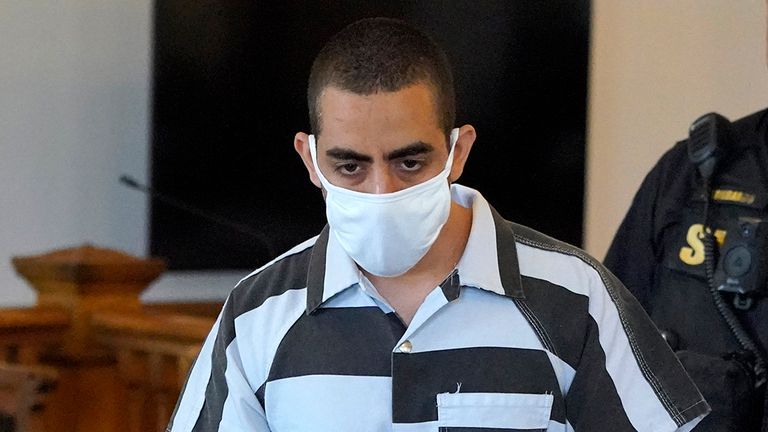Sir Salman Rushdie suffered “life-changing” injuries when he was stabbed, but has been “able to say a few words” and retains his “usual feisty and defiant sense of humour”, his son has said.
The 75-year-old author was airlifted to hospital and underwent hours of surgery following the attack on stage in Chautauqua, New York state, on Friday.
His son Zafar Rushdie said Sir Salman remained in a “critical condition” but was taken off a ventilator on Saturday.
“Though his life-changing injuries are severe, his usual feisty and defiant sense of humour remains intact,” he said in a statement.
Sir Salman was stabbed about 12 times, including in the face and neck, the Chautauqua County District Attorney’s Office said.
One of the wounds in the facial area caused a puncture to his eye. Another, to the abdomen, caused a puncture of the author’s liver.
There were also stab wounds to the abdomen and chest area.
Earlier on Sunday, in an update on his condition, his literary agent, Andrew Wylie, confirmed Sir Salman had been taken off the ventilator, saying: “The road to recovery has begun.
“It will be long; the injuries are severe, but his condition is headed in the right direction.”
Speaking in Chautauqua on Sunday, New York governor Kathy Holchul condemned the attack as “cowardly,” adding: “A man with a knife cannot silence a man with a pen.”
On Saturday, the suspect pleaded not guilty to attempted murder.
Hadi Matar, 24, appeared in court wearing a black and white jumpsuit and a white face mask, his hands cuffed in front of him.
Read more:
The world reacts to the stabbing of Sir Salman Rushdie
What do we know about the suspect?
Why is Salman Rushdie so controversial?
The attack
Sir Salman, who lives in New York City and became an American citizen in 2016, was due to speak to Henry Reese, from the City of Asylum organisation, a residency programme for writers living in exile under threat of persecution.
They were expected to discuss America’s role as an asylum for writers and other artists in exile and as a home for freedom of creative expression.
He was being introduced at the Chautauqua Institution when a man stormed the stage and began stabbing him.
He fell to the floor as the suspect was pinned down by audience members and staff.
Ms Holchul, who met some of them on Sunday, said she could “still see the trauma and pain in their faces.
“They are trying to figure out how something like this could happen,” she added.
The Satanic Verses
Sir Salman’s book The Satanic Verses was banned in 1988 in a number of countries with large Muslim populations, including Iran, after it was considered by some to contain blasphemous passages.
In 1989, Iran’s then leader Ayatollah Ruhollah Khomeini issued a fatwa, or edict, calling for Sir Salman’s death.
The author lived in exile for years, but told a German magazine earlier this month he believed his life had returned to being “relatively normal”.



